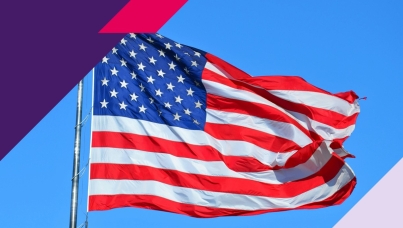Americans believe sports teams and stadiums are positive for cities
Washington, DC, March 10, 2025 – A new Ipsos poll finds that four in five Americans with professional sports teams in their city/nearest metro area say that these teams have a positive impact on their local economy. Americans overall also agree that sports stadiums are good investments for cities, although there is broad support for limiting the amount taxpayer funds used to fund these stadiums.
However, a majority of Americans, including those that consider themselves to be sports fans, continue to believe that sporting events are too expensive for the average person to attend and that ticket prices are more expensive than ever.
The poll also finds that around half of Americans, and majority of sports fans, believe there are more fans of women’s sports now than ever before. Similar percentages also agree that investing in women’s sports is a good business decision for brands.
In addition to these topics, this poll also explores, sports betting, what is most important to the experience of sports fans, and the upcoming World Cup and Summer Olympics that will be mostly hosted in the United States. Compared to last year, slightly more Americans report playing sports, and almost twice as many report betting on sports. Lastly, football is atop the list of sports that Americans are fans of, and the NFL is the most popular sport watched by Americans.
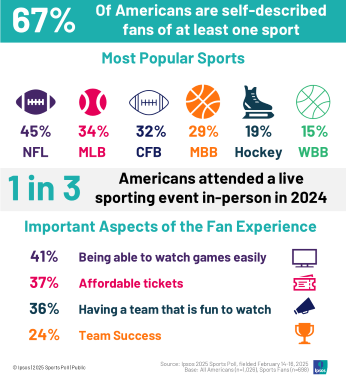
Detailed Findings
1. Two in three Americans are self-reported fans of at least one sport. Additionally, about half of Americans reported playing at least 1 of the 16 sports polled on at any time during 2024.
- Sixty-seven percent of Americans say they are fans of at least one sport, in line with 2024 and 2023 (68% each). Professional football tops the list of sports that Americans say they are fans of, followed by baseball, college football, and men’s basketball.
- Just over half of Americans say they played a sport in 2024 (52%), up slightly from last year (48%). Cornhole (21%), swimming (19%), and bowling (19%) continue to be the most-played sports.
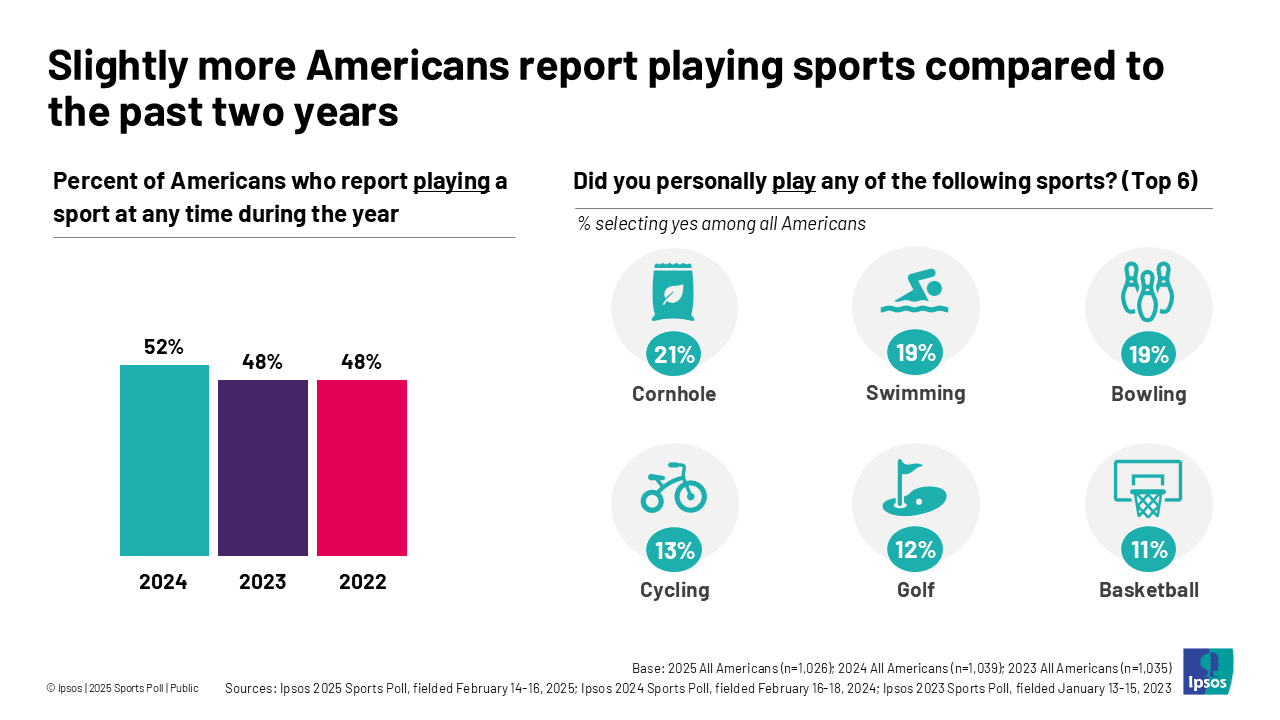
2. Consistent with the last year, the NFL is the most popular sport watched by Americans in the past year.
- Nearly three in five Americans (59%) say they have watched an entire NFL game in the past year. This jumps to 77% among sports fans.
- The second tier of sports watched among Americans and sports fans includes college football (watched by 38% of Americans and 52% of sports fans), the MLB (38% and 51%), the NBA (29% and 39%), and men’s college basketball (29% and 40%).
- Of note, the percentage of both Americans and sports fans that have watched an entire MLB game has increased five percentage points from 2024.
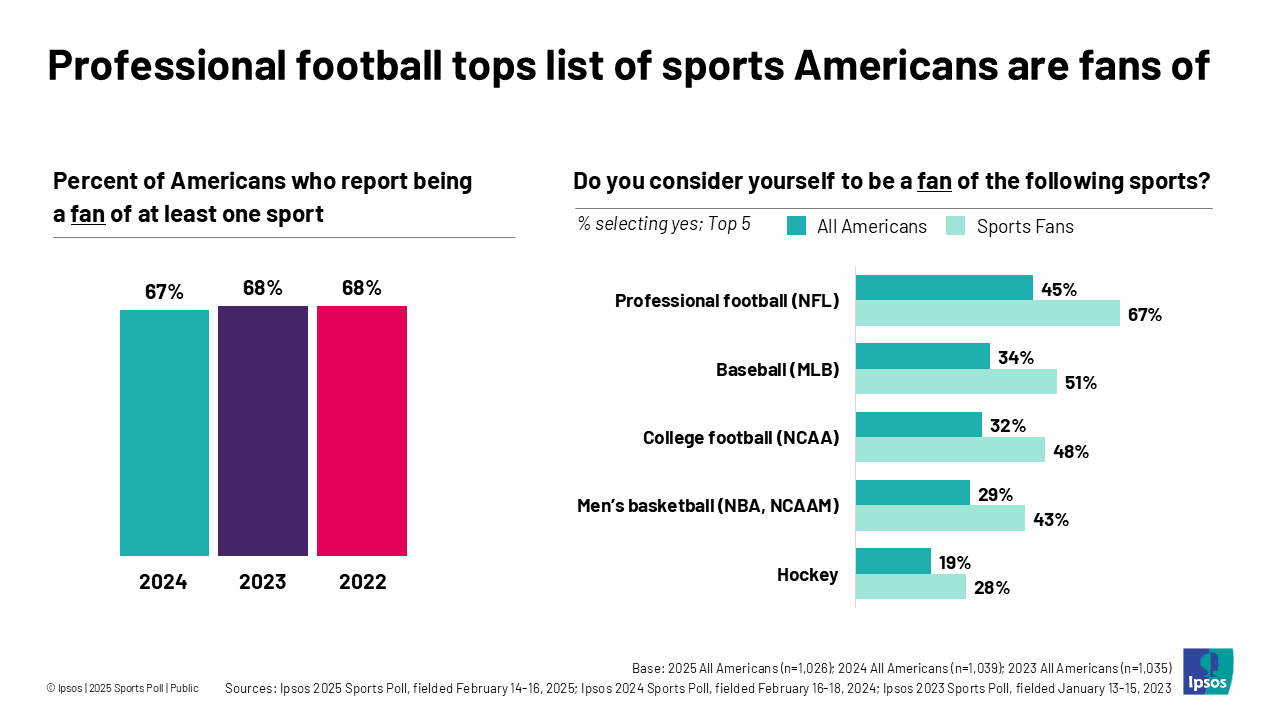
3. Americans with professional sports teams in their area largely believe they are a positive influence. However, most also support limiting the use of taxpayer funds for stadiums.
- Among those that have a professional sports team in their city/metro area, four in five say the teams have a positive impact on the local economy (80%). Seventeen percent say that there is no impact, and few say that there is a negative impact (3%).
- In the same vein, a majority of Americans (55%) agree that sports stadiums are good investments for cities. However, sports fans (64%) are more likely than non-sports fans (35%) to agree.
- Americans also want limits on taxpayer money that is used to help finance these stadiums. Nearly two in three (64%) would support a law in their state that limits the amount of taxpayer funds that sports teams are allowed to use for new stadiums and/or stadium renovations, in line with 2024 (67%). Seventy-two percent of sports fans share this sentiment.
- Around half of Americans and sports fans alike say they are tired of seeing celebrities shown on screen during sports broadcasts (47% and 52%, respectively). A similar percentage say the same of broadcasts showing Taylor Swift (45% and 47%, respectively).
- Of note, this proposed law has bipartisan support, as majorities of Democrats (63%), independents (66%), and Republicans (67%) say they would support this law.
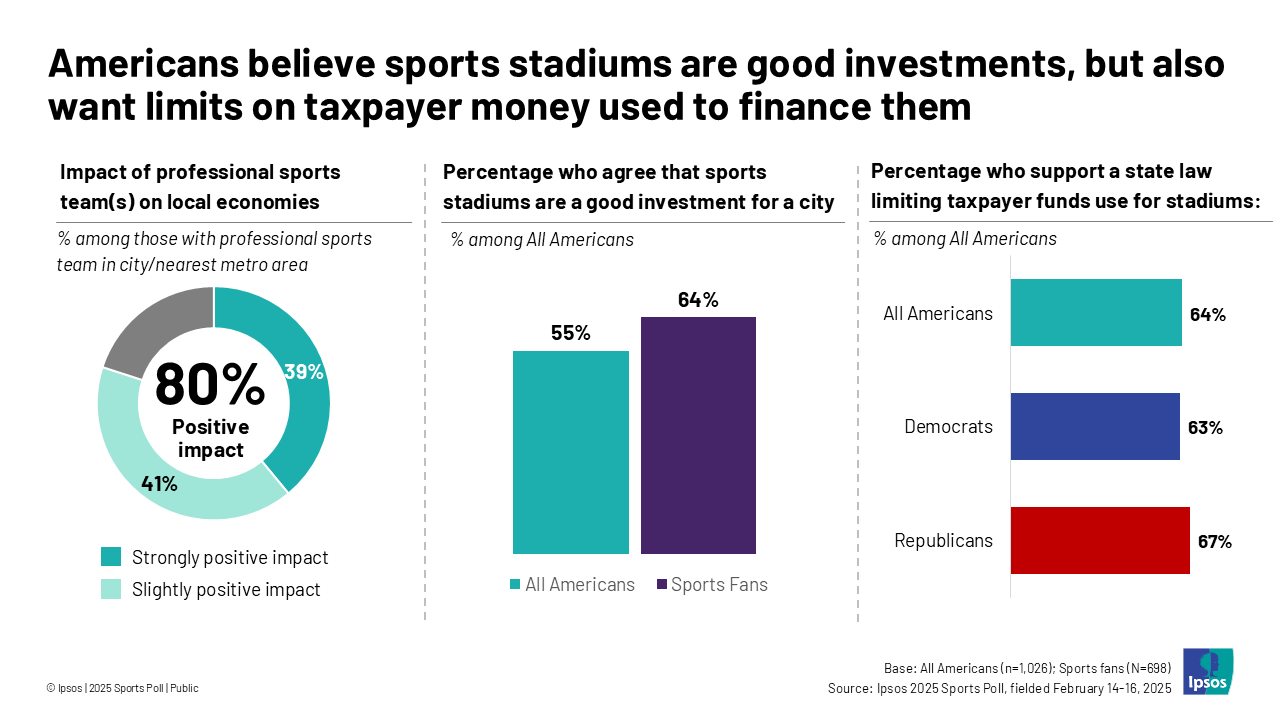
4. A majority of Americans continue to feel that sporting events are too expensive for the average person.
- Seventy-six percent of Americans and 86% of sports fans believe sporting events are too expensive for the average person to attend. Similar to 2024, a majority across all demographics agree.
- Similarly, 76% of Americans and 87% of sports fans also agree that sports tickets are more expensive than ever.
- Nearly three in five Americans (58%) agree that there are too many platforms needed to watch live sports, in line with 2024. Sixty-eight percent of sports fans share this sentiment.
- Along these lines, 49% of Americans and 58% of sports fans say they support a sports streaming package that bundles multiple streaming platforms for one monthly or annual payment. Support among both groups is up from last year (44% and 53%, respectively).
5. Accessibility of games and tickets, as well as having a fun team to watch, are most important to sports fans.
- Being able to watch the games easily (41%) is the most important element of sports fandom among sports fans, followed by affordable tickets (37%) and having a team that is fun to watch (36%).
- Team success (24%) is in the second tier of importance, while fewer say the same of having a team that takes on the identity of the city (11%) and having a fun stadium experience (9%).
- Americans (39% agree, 32% disagree) and sports fans (43% agree, 41% disagree) are split on if sports dynasties or dominant teams are boring.
- In contrast, few Americans (21%) believe it is harder to stay interested in sports because seasons are too long; a majority of sports fans disagree with this sentiment (61%).
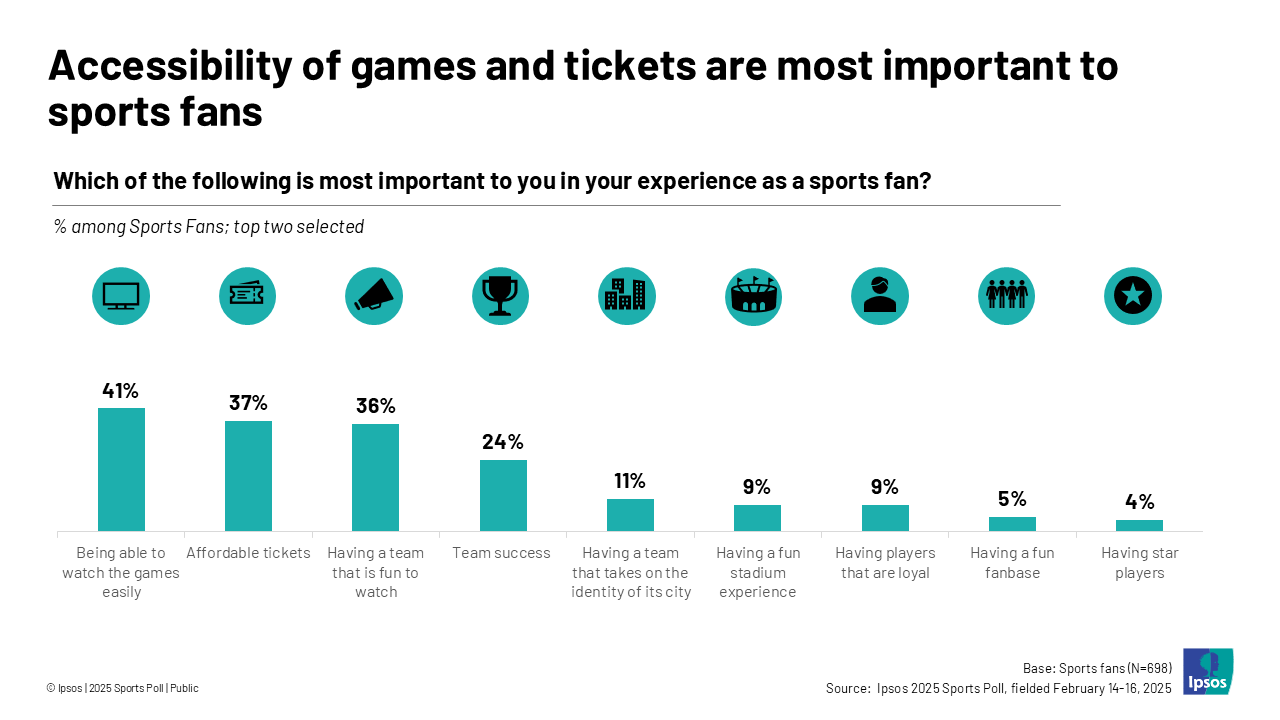
6. Many Americans and sports fans believe there have never been more fans of women’s sports.
- Half of Americans (51%) agree that there are more fans of women’s than sports than ever before, including a majority of sports fans (62%). Of note, Americans ages 55+ (57%) are more likely to agree than their younger counterparts (46% among those ages 18-34, 48% among those ages 35-54).
- A similar percentage of both Americans (52%) and sports fans (60%) also agree that it is a good business decision for brands to invest more in women’s sports.
- However, 41% of Americans say they want to see more coverage of women’s sports, down from 2024 (49%) and in line with 2023 (42%).
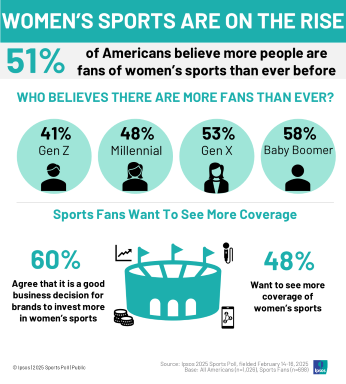
7. More Americans are reporting that they bet on sports compared to a year ago. However, as betting increases, concerns about the integrity of the games and reduced enjoyment watching persist.
- Thirteen percent of Americans report placing a bet on a live sporting event in-person or online, up from 7% a year ago. Both online (11% vs. 7%) and in-person (7% vs. 3%) sports betting showed year-over-year increases.
- Around three in five Americans (59%) and sports fans (65%) agree that people should be able to gamble on sports and spend their money how they wanted, stable from both 2024 and 2023.
- However, concerns about integrity of competition continue to exist. Forty-one percent of Americans and 47% of sports fans believe that sports betting lessens the integrity of the games. Notably, Americans ages 55+ (48%) are more likely to hold this sentiment compared to younger Americans.
- Additionally, around two in five Americans (40%) and sports fans (43%) agree that the amount of sports betting advertisements lessens their enjoyment of the game. A similar percentage of both groups would support the federal government banning sports betting ads during games (40% and 42%, respectively).
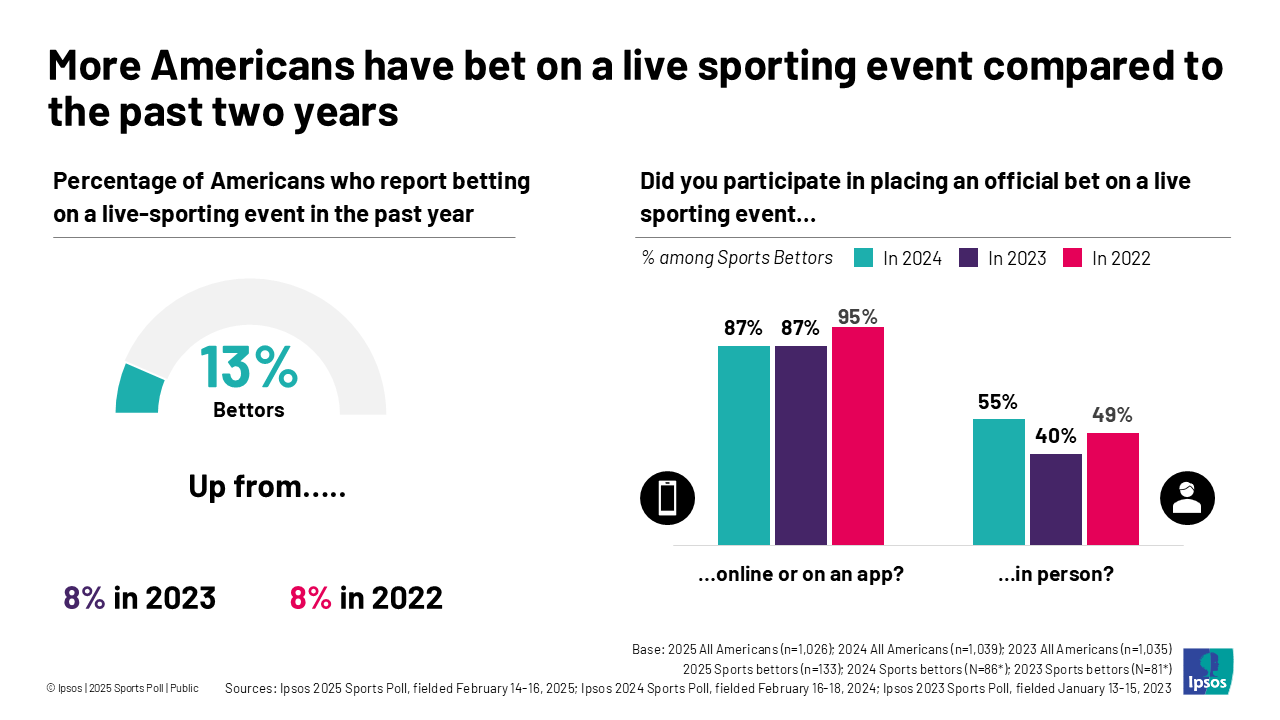
8. Americans are more familiar and interested in the 2028 Summer Olympics than the 2026 World Cup.
- Forty-seven percent of Americans and 61% of sports fans are familiar with the 2028 Summer Olympics in Los Angeles. Fewer are familiar with the 2026 World Cup that will be mostly held in the U.S. (30% and 39%, respectively).
- In the same vein, more Americans and sports fans are interested in the Summer Olympics (57% and 69%) than the World Cup (29% and 38%).
- Of note, Americans ages 55+ are more familiar and interested in the 2028 Summer Olympics than their age 18-34 counterparts. In contrast, Americans ages 18-34 are more interested in the World Cup than their older counterparts.
About the Study
This poll was conducted February 14-16, 2025, by Ipsos using the probability-based KnowledgePanel®. This poll is based on a nationally representative probability sample of 1,026 general population adults age 18 or older. The sample includes 698 sports fans.
The survey was conducted using KnowledgePanel, the largest and most well-established online probability-based panel that is representative of the adult US population. Our recruitment process employs a scientifically developed addressed-based sampling methodology using the latest Delivery Sequence File of the USPS – a database with full coverage of all delivery points in the US. Households invited to join the panel are randomly selected from all available households in the U.S. Persons in the sampled households are invited to join and participate in the panel. Those selected who do not already have internet access are provided a tablet and internet connection at no cost to the panel member. Those who join the panel and who are selected to participate in a survey are sent a unique password-protected log-in used to complete surveys online. As a result of our recruitment and sampling methodologies, samples from KnowledgePanel cover all households regardless of their phone or internet status and findings can be reported with a margin of sampling error and projected to the general population.
The study was conducted in English. The data for the total sample were weighted to adjust for gender by age, race/ethnicity, education, Census region, metropolitan status, and household income. The demographic benchmarks came from the 2024 March Supplement of the Current Population Survey (CPS).
- Gender (Male, Female) by Age (18–29, 30–44, 45-59 and 60+)
- Race/Hispanic Ethnicity (White Non-Hispanic, Black Non-Hispanic, Other, Non-Hispanic, Hispanic, 2+ Races, Non-Hispanic)
- Education (Less than High School, High School, Some College, Bachelor or higher)
- Census Region (Northeast, Midwest, South, West)
- Metropolitan status (Metro, non-Metro)
- Household Income (Under $25,000, $25,000-$49,999, $50,000-$74,999, $75,000-$99,999, $100,000-$149,999, $150,000+)
The margin of sampling error is plus or minus 3.2 percentage points for at the 95% confidence level, for results based on the entire sample of adults. The margin of sampling error takes into account the design effect, which was 1.09 for all respondents. For sports fans, the margin of sampling error is plus or minus 3.9 percentage points at the 95% confidence level, and the design effect was 1.08. The margin of sampling error is higher and varies for results based on other sub-samples. In our reporting of the findings, percentage points are rounded off to the nearest whole number. As a result, percentages in a given table column may total slightly higher or lower than 100%. In questions that permit multiple responses, columns may total substantially more than 100%, depending on the number of different responses offered by each respondent.
This topline is trended with data from previous Ipsos polls:
- The 2024 poll was fielded February 16-18, 2024 using the probability-based KnowledgePanel®. This poll is based on a nationally representative probability sample of 1,039 general population adults age 18 or older. The margin of sampling error is plus or minus 3.2 percentage points for at the 95% confidence level, for results based on the entire sample of adults. The margin of sampling error takes into account the design effect, which was 1.09 for all respondents. More information about this poll can be found here.
- The 2023 poll was fielded January 13-15, 2023 using the probability-based KnowledgePanel®. This poll is based on a nationally representative probability sample of 1,035 general population adults age 18 or older. The margin of sampling error is plus or minus 3.2 percentage points for at the 95% confidence level, for results based on the entire sample of adults. The margin of sampling error takes into account the design effect, which was 1.12 for all respondents. More information about this poll can be found here.
About Ipsos
Ipsos is one of the largest market research and polling companies globally, operating in 90 markets and employing over 18,000 people.
Our passionately curious research professionals, analysts and scientists have built unique multi-specialist capabilities that provide true understanding and powerful insights into the actions, opinions and motivations of citizens, consumers, patients, customers or employees. Our 75 solutions are based on primary data from our surveys, social media monitoring, and qualitative or observational techniques.
Our tagline "Game Changers" sums up our ambition to help our 5,000 customers move confidently through a rapidly changing world.
Founded in France in 1975, Ipsos has been listed on the Euronext Paris since July 1, 1999. The company is part of the SBF 120 and Mid-60 indices and is eligible for the Deferred Settlement Service (SRD).
ISIN code FR0000073298, Reuters ISOS.PA, Bloomberg IPS:FP www.ipsos.com

